Blog
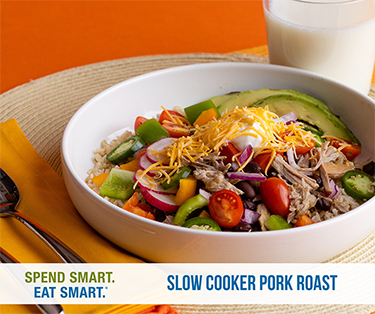
Slow Cooker Pork Roast
It’s finally my favorite time of year for cooking! In my opinion, you just can’t beat cooking fall dishes. Our recipe of the month is Slow Cooker Pork Roast and it is a winner!
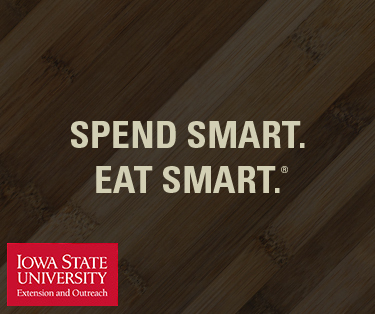
Needs versus wants applies to food
Recently, I did an educational program on Spend Smart. Eat Smart. for employees at a local public health department. A dietitian in the group shared a way her family could save money on milk: “Get my family to drink more water and not always drink milk.” Some in the group seemed surprised that a dietitian would make that suggestion. What did she actually mean? Her point was that she wants her family members to drink the amount of milk they need nutritionally, but not necessarily more than that.

Kid Tested Homemade Chicken Tenders
Almost every child I know loves chicken tenders…it might be because they can pick them up with their fingers, or it might be they like dipping them. Actually I like finger food and dipping myself. What I don’t like about the prepared chicken nuggets is the amount of fat and sodium you get along with the chicken. The chicken tenders recipe we feature this month has a sauce you mix up to dip the chicken in, then coat with pretzel or cereal crumbs, and bake—instead of fry. The chart below compares the cost and nutrition of these tenders compared to a chain fast food outlet. You’ll note from the chart that our tenders provide more food (look at the weight) for much less fat and sodium and more protein. If you choose a whole grain cereal as the coating, you could add some fiber and other nutrients.

What is Greek Yogurt?
Greek yogurt is becoming more popular. Last week one of my friends asked me what Greek yogurt was…was it yogurt from Greece?

Schools Back in Session
Here in Iowa, schools are back in session. For some families this means packing lunches, although the cost of school lunches is hard to beat, and packed lunches are not automatically healthier than school lunch.

Nut milk, rice milk – Really?
I grew up on a farm and from what I know, milk comes from a cow. It is that white liquid farmers “milk” for us humans before the baby calves get to it. Cow’s milk is a good source of protein calcium, potassium, and Vitamin D (since all cow’s milk is fortified).

The Secret Behind Supplements
After being diagnosed with iron-deficiency anemia, I started to take an Iron + Vitamin C supplement every day. I also started to eat foods with a higher iron content more often. So, this makes me wonder: how much do people spend on supplements compared to their grocery bill? According to the National Institutes of Health, $33.9 billion was spent on alternative medicine in the year 2008. That is more than what the National Football League (NFL) is worth! Also, more than half of Americans are popping multivitamin pills daily and about one-third are using some sort of alternative medicine (vitamins or herbs in a pill form).

Crispy Salmon Patties
I grew up on a farm in northwest Iowa. My dad raised hogs, beef, soybeans and corn. Guess how many times we had salmon when I was growing up. That’s right, NEVER.
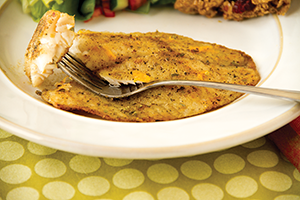
Pan Fried Tilapia with Orange Sauce
Growing up, we pretty much stuck to breaded fish sticks and squares and then for special occasions – shrimp cocktail. Once in a while my mom bought frozen fish and dipped it in egg and then cornmeal and fried it. As an adult, knowing fish was good for me (great protein plus low in calories and fat), I used to buy those frozen rectangles of raw fish, but prying frozen fillets apart was not fun.
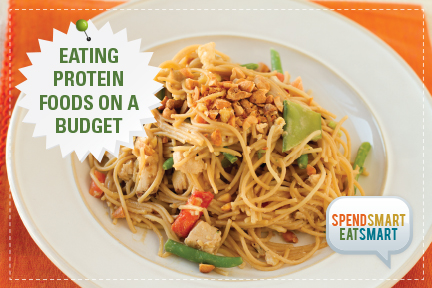
Eating protein foods on a budget
My total is what?!? There has been a lot of sticker shock at the grocery store lately. Food prices in general have increased in the last couple of years, but meat prices have gotten a lot of attention lately. Foods from the Protein Foods Group are important sources of protein, iron, vitamins B and E, zinc and magnesium. Therefore, it’s necessary to determine how to fit them into your diet but stay within your food budget.
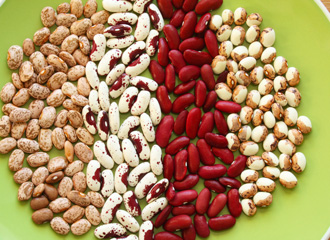
Beans, Beans the Musical Fruit
There are many benefits to eating beans. They are high in fiber, protein, iron, folate, and potassium. In addition, they are inexpensive so easy on the budget. There’s just one little problem…they can cause intestinal gas. And how embarrassing is that! The good news is there are ways to help reduce the amount of intestinal gas caused by eating beans.
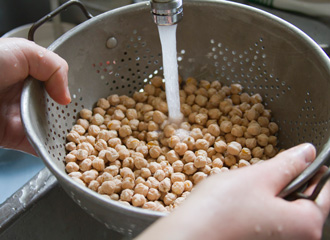
Don’t Let Dry Beans Scare You
As I wrote in my last blog on beans, they fit many of my requirements as a mom and dietitian. They are very nutritious, they’re inexpensive, and they work well in dishes my family enjoys. Most of the time I use canned beans. They are very convenient and besides draining and rinsing, require no additional cooking. You can find ‘no salt added’ canned beans, which is great since many of us get more than enough sodium in our diets. And they usually don’t cost any more than the regular kind. If you’d rather not use the ‘no salt added’ kind, rinse the beans to reduce the sodium.

